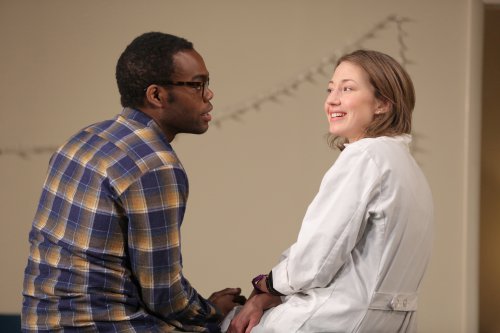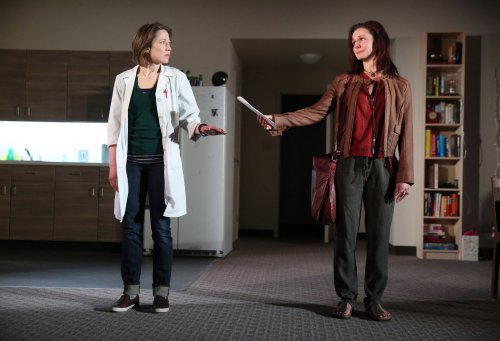Placebo
Female sexual wonder drug experiment turns out to actually be a tease in this tedious and uninvolving contemporary romantic drama among academics.
[avatar user=”Darryl Reilly” size=”96″ align=”left” ] Darryl Reilly, Critic[/avatar] “I used to be someone who wanted to do it all the time. I mean All The Time. I used to be someone who’d mess around at the drop of a hat. Just ask my husband. Just ask Jeff. I felt so connected and now I’m someone who has to force myself to mess around with my husband. “
The anguished, middle-aged Mary confesses this to 32-year-old research assistant, Louise, in the wrenching short opening scene of playwright Melissa James Gibson’s Placebo. Unfortunately, this intriguing introduction is succeeded by a bewilderingly tedious 95-minute exploration of a disintegrating romantic relationship.
Mary is a paid volunteer in the unseen Dr. Crumb’s “randomized double blind placebo controlled” pharmaceutical research study of “steady relationship diagnosis of female sexual disorder.” The name of the drug is “Resurgo” which “aims to get inside a woman’s mind.”
Mary briefly reappears a few more times during the play to update her progress and to ponder if she’s receiving the drug or the placebo.
Otherwise this dull play is about Louise’s live-in relationship of about four years, with the mid-30’s, self-absorbed Jonathan. He is a classical scholar agonizing over his Ph.D. dissertation on Pliny, while struggling to quit smoking. This gives Miss Gibson the opportunity to throw in a lot of arch academic humor. “Why can’t I be like Pliny?” “Dead?” “Superhuman.” “I do love food I just don’t like gathering it.”
Besides Louise’s emotionally involving work and her increasingly fractious relationship, she is also dealing with her mother is dying a long distance away. The couple has numerous arguments leading to a fierce confrontation with circuitous results.
The play’s scenes alternate between the scientific research institute and the couple’s apartment. The theatrical device of having one set representing both places is well rendered by scenic designer David Zinn’s realistic and well-appointed set. Matt Frey’s lighting design and Ryan Rumery’s sound design contribute requisite razzle dazzle effects for the transitions from one setting to another. Mr Zinn also designed the purposeful costumes.
Ms. Gibson’s monotonous, rote writing, and flat characterizations are served well by the cast who do their best. The two smaller roles come across most effectively due to their contained placement.
Florencia Lozano in her periodic appearances as Mary are filled with great depth. She winningly depicts this contemporary woman’s pain with arresting simplicity. Alex Hurt is Tom, a research assistant on another project, who interacts with Louise in the institute’s break room. Mr. Hurt is engagingly deadpan and charmingly portrays the wry resignation of the character.
William Jackson Harper’s dry delivery and well-modulated rages, do a lot to make the odious Jonathan sympathetic. Tony nominated for her role as Honey in the 2012 Broadway revival of Who’s Afraid of Virginia Woolf? and a star of the 2014 David Fincher film, Gone Girl, Carrie Coon does yeoman work as Louise. She brings as much liveliness and emotion to this insipid role as possible.
The direction by Daniel Aukin is impeccably professional and at times inspired, realizing the deficient material with finesse.
A running gag involves Tom and Louise’s slapstick antics in reacting to a faulty snack vending machine in the institute’s break room. It’s as hollow and tiresome as virtually the rest of Placebo.
Placebo (through April 5, 2015)
Playwrights Horizons, 416 West 42nd Street, in Manhattan
For tickets, call 212 564-1235 or visit http://www.playwrightshorizons.org
Running time: one hour and forty minutes with no intermission








Leave a comment